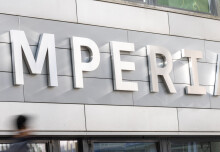

Over 3,500 young people attend programmes at Imperial to further their interest in science - <em>News Release</em>
Imperial College London News Release
See also...
For immediate release
Wednesday 6 August 2008
A range of summer schools and events at Imperial College London are aiming to inspire over 3,500 young people to take their interest in science a step further.
The College’s Summer Schools programme is now in full swing, with over 30 different courses taking place between July and September. Organised by the College’s Outreach Office in partnership with Exscitec, the courses aim to raise aspirations amongst school pupils and further their interest in the world of science. In addition, they give pupils a taste of university life and a chance to meet academics and current students to encourage them to consider higher education.
Over 3,500 young people attend the outreach programmes
Pupils from across the UK, aged 11 to 18, attend the programmes, which range from building robots to using computers to make artworks and learning about how Google’s search engine works. Director of Access and Head of Outreach at Imperial, Melanie Thody, said:
“Many young people without a family tradition of higher education can find the idea of going to university daunting. We hope that these taster activities will break down that barrier and help them to see the exciting possibilities they have ahead of them.
“In particular, with fewer young people in the UK studying science and maths at A level and beyond, it’s vital that we give them a chance to see how thrilling university science can be. Hopefully we are encouraging an interest that will last a lifetime.”
This year’s outreach programme has expanded with a number of new courses, including the new Creative Computing course, a collaboration between Imperial, the University of Warwick, Exscitec and Google, which took place in July.
Students had the rare opportunity to tour the main Google headquarters in London and meet software engineers to learn about the science behind the search engine.
Other activities on the course included learning how to write code for Google Maps and using the battleships computer game to understand one of the strategies that Google uses to make search engines work on huge datasets.
Students on this course were given an introduction to Imperial’s Department of Computing and guidance on career options in the field of computing. They also had the opportunity to design their own robots and artworks using an artistic artificial intelligence system.
In July, the Outreach Office in conjunction with the College’s Faculty of Medicine piloted a new course called MedEx, a week long non-residential course for 16 to 17 year olds. The programme provided a taste of what life is like as medical student at Imperial and gave pupils valuable medical experience to help them with their UCAS application. Students also shadowed a doctor at Chelsea and Westminster Hospital.
The five day residential Robotics Summer School is currently taking place, during which teams of 11 to 14 year olds design robots. Students will learn about engineering planning and design, gear ratios, robotic platform and parts assembly, radio control, power supplies and remote control devices.
The Outreach Office also organises open days, mentoring and tutoring schemes, science activities including demonstration lectures and school visits.
Muryum Khan attended the Robotics Summer School
Case Studies:
1) Thirteen year old Muryum Khan, from Oaklands Secondary School in Tower Hamlets, attended the week long Robotics Summer School. This is her third summer school programme at Imperial. She says:
“I have done this course for the last three years and have really enjoyed it. It provides hands-on experience and a chance to learn about different components used for building the robots. I have also made lots of new friends over the three years here and hope to keep in touch with people I have met this week.
“Every year I have learnt something new and they have given me an insight into engineering and technology.
“The mentors are always really friendly and are good at helping us draw up ideas. “I am looking forward to the competition at the end of the week and fairly confident our team have a good chance.
“It has made me more determined to get to university and I think the summer schools are great at opening up my options for the future. I would really like to come back again next year.”
2) Jonathan Casey, aged 12, from Watford Boys Grammar School, also attended the Robotics Summer School. This is his first summer school programme at Imperial. He says:
Jonathan Casey attended his first summer school
“We have been working in teams this week to make two different robots. At the end of the programme we are having a competition and I am really looking forward to competing against the others. The aim of the week is to make a robot which can quickly move around and pick up balls in the arena we have built. We have to do a presentation on the last day and the quickest robot wins the competition.
“The best thing about this week has been working together and meeting new people. We had to build a structure made out of plastic bags to fit my entire team in for ten seconds which was really fun.
“The hardest thing has been waking up at 6am every morning to get here from Watford and understanding how each part of the robot works and seeing where everything goes.
“This week has been really exciting and I would like to go into engineering when I’m older.
“The mentors have been really helpful and have given us loads of useful tips. I would definitely come back next year.”
Photos are available of the various Outreach programmes, Jonathan casey and Muryum Khan.
-ends-
For further information please contact:
Naomi Weston
Press Officer
Imperial College London
Email: n.weston@imperial.ac.uk
Tel: +44 (0)20 7594 6704
Out of hours duty press officer: +44 (0)7803 886 248
Notes to editors:
Programme of summer schools includes:
30 June – 4 July – Games SET Maths Summer School is a residential programme for 15 to 16 year olds and engages students in activities which illustrate the links between a range of science, technology, engineering and maths disciplines and the 2012 Olympics. Subjects covered include communicating the Games to a global audience, construction, engineering and the built environment and biomedical science.
14 – 18 July - Maths Summer School which is for 15 to 16 year olds and explores the many contexts of mathematics application in scientific research. It provides a series of mathematics investigations and helps students see how understanding maths helps understand the wider world. The course includes advice on routes to further study, higher education and wide-ranging careers, as well as giving an experience of what university life is like.
14 -18 July – MedEx Summer School is a week long non-residential course for 16 to 17 year olds.
21 – 24 July – North East Year 10 Summer School provides young people with high ability and aptitude the opportunity to experience, at first hand, the excitement of a scientific investigation.
22 – 24 July – Imperial WISE – Women Into Science and Engineering is open to all female Year 10 students who are interested in science or engineering. There will be two separate streams running together with exciting hands-on activities and students can apply for either the science or engineering stream. The course will also provide students with an insight into university life through staying in university halls and spending time with undergraduate mentors.
28 July - 9 August and 26-28 August – Robotics Summer Schools
4-8 August – Salters Chemistry Camps includes interactive and informative demonstration lectures and hands-on practicals.
11 – 22 August – G&T Space Science Summer School involves students investigating the chemistry involved in a mock mission to Mars, a robotics course looking at the engineering processes with a focus on autonomous control in the context of robotics and investigating the ways in which mathematics can assist in solving the problems associated with astronomy and space exploration.
15 – 17 September – Entrepreneurial Bioscience Course involves a hands-on biology mini- investigation, with guest speakers from research and industry.
About Imperial College London
Imperial College London - rated the world's fifth best university in the 2007 Times Higher Education Supplement University Rankings - is a science-based instituti on with a reputation for excellence in teaching and research that attracts 12,000 students and 6,000 staff of the highest international quality. Innovative research at the College explores the interface between science, medicine, engineering and business, delivering practical solutions that improve quality of life and the environment - underpinned by a dynamic enterprise culture.
Website: www.imperial.ac.uk
Article text (excluding photos or graphics) available under an Attribution-NonCommercial-ShareAlike Creative Commons license.
Photos and graphics subject to third party copyright used with permission or © Imperial College London.





